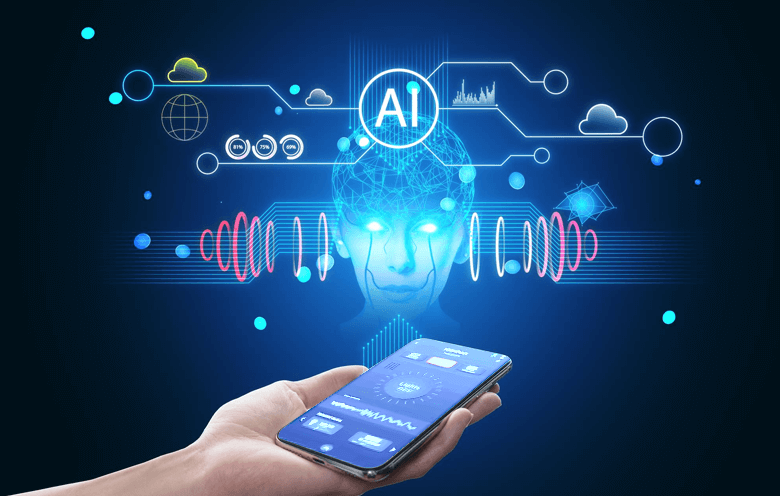As mobile apps continue to proliferate in our daily lives, creating a standout user experience (UX) has never been more crucial for app developers and businesses. Artificial Intelligence (AI) is transforming the way users interact with mobile apps, enabling personalized experiences that cater to individual preferences and behaviors. In this blog, we’ll explore how AI enhances mobile app user experiences and why incorporating AI into your app development strategy is essential for success.

Table of Contents
Toggle1. Personalization and Recommendations
How AI Works:
AI algorithms analyze user behavior, preferences, and historical data to deliver personalized content and recommendations. This could include suggesting products in an e-commerce app, recommending articles in a news app, or offering tailored music playlists in a streaming app.
Benefits:
- Increased Engagement: Personalized experiences keep users engaged by delivering content that resonates with their interests.
- Higher Conversion Rates: Recommendations can lead to more purchases, sign-ups, or desired actions, driving business growth.
- User Retention: A tailored experience fosters loyalty, as users are more likely to return to apps that cater to their specific needs.
2. Enhanced Search Functionality
How AI Works:
AI-powered search features utilize natural language processing (NLP) and machine learning to improve search accuracy and relevance. They can understand user intent and context, making search results more precise.
Benefits:
- Voice Search: AI enables voice-activated search features, allowing users to find what they need hands-free, enhancing accessibility and convenience.
- Contextual Results: AI can deliver context-aware search results based on user location, previous searches, and preferences, improving the overall search experience.
3. Chatbots and Virtual Assistants
How AI Works:
AI-driven chatbots and virtual assistants provide instant support and assistance to users, answering questions, guiding them through app features, or helping with transactions.
Benefits:
- 24/7 Support: Users can get help anytime, which enhances their experience and builds trust in the app.
- Reduced Response Time: AI chatbots can handle multiple queries simultaneously, ensuring users receive quick answers without waiting for human support.
- Improved User Onboarding: Chatbots can assist new users in navigating the app, reducing frustration and improving retention rates.
4. Predictive Analytics
How AI Works:
Predictive analytics leverages AI algorithms to analyze user data and predict future behaviors, preferences, and trends. This information helps businesses make informed decisions about app features, marketing strategies, and user engagement.
Benefits:
- Proactive Engagement: By anticipating user needs, businesses can create targeted campaigns or features that enhance user satisfaction.
- Optimized Content Delivery: Predictive analytics helps in delivering the right content at the right time, improving the likelihood of user interaction.
5. User Behavior Analysis
How AI Works:
AI tools can monitor user interactions within the app, identifying patterns and trends in user behavior. This data is invaluable for making improvements and optimizing the app experience.
Benefits:
- Informed Design Decisions: Understanding how users navigate your app allows developers to make data-driven decisions for UI/UX enhancements.
- Reduced Churn Rates: By identifying potential pain points and addressing them proactively, businesses can minimize user churn and increase retention.
6. Enhanced Security Features
How AI Works:
AI algorithms can analyze user behavior to detect anomalies and potential security threats in real time. This is especially critical for apps handling sensitive data or financial transactions.
Benefits:
- Fraud Detection: AI can identify suspicious activity, such as unauthorized transactions or account breaches, enhancing user trust and security.
- Adaptive Security Measures: The system can adapt to new threats as they emerge, ensuring continuous protection for users.
7. Augmented Reality (AR) Integration
How AI Works:
AI can power AR features within mobile apps, allowing users to visualize products or experiences in their real-world environments. For example, furniture apps can let users see how a piece fits into their living space.
Benefits:
- Interactive Experiences: AR creates immersive experiences that captivate users and drive engagement.
- Informed Purchasing Decisions: By visualizing products in their environment, users are more likely to make informed purchasing decisions, reducing return rates.
Conclusion
Integrating AI into mobile app development is no longer optional; it’s essential for enhancing user experiences. From personalized recommendations and enhanced search functionality to AI-driven chatbots and predictive analytics, the potential of AI to improve engagement, retention, and user satisfaction is immense. As businesses continue to prioritize user experience, leveraging AI technology will be key to staying competitive in the fast-paced mobile app landscape. By embracing AI, you can create apps that not only meet user expectations but exceed them, fostering loyalty and driving long-term success.


No responses yet